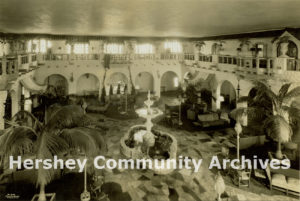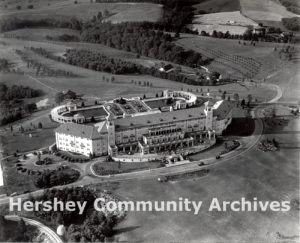World War II: The Vichy Internment at the Hotel Hershey

Many know that Hershey Chocolate Corporation played a key role in supporting the war effort during World War II. Hershey devoted the bulk of its chocolate production to the military. Hershey Chocolate Corporation was also responsible for the development and production of the Ration D bar, a survival ration that provided subsistence calories and nutrition to soldiers facing extreme conditions. However, unknown to most people is the role Hershey played during World War II, serving as jailer to enemy French diplomats.
Like other American communities, Hershey responded to war time conditions. There were a lot of restrictions, as everywhere. Everything was mobilized in Hershey for the civilian war effort. Everybody took every course that came along. Alma Bobb remembered going on aircraft warning service every fourth night from 2:00 to 4:00 in the morning. At first, the station was up on top of one of the cupolas at the Hotel Hershey until the hotel became the internment location for the Vichy French. So then that station moved down to one of the towers at the Milton Hershey School Senior Hall.
Germany invaded and defeated France in the spring of 1940. A large portion of southwestern France was left unoccupied by the conquering army. A new French government, sympathetic to the Nazi regime, was established in the town of Vichy. As part of political protocol, the Vichy government sent Gaston Henri-Haye to Washington, D.C. to serve as the French ambassador to the United States. Some questions were raised as to whether the United States should recognize the government of Nazi occupied France, but acceptance was quickly granted.
But by late 1942, the United States had lost patience with the pro-Hitler French government. After Germany occupied France and arrested American diplomatic personnel, the United States responded in kind, arresting the Vichy government ambassador and his staff.
The Hotel Hershey was chosen to sequester the Vichy French government representatives for several reasons. Hershey Estates was cooperative, the quality of accommodations was quite high and, possibly most important, the Hotel was in a secluded and defensible location.
By early evening November 17, 1942, French Ambassador Gaston Henri-Haye, eighteen members of his staff, various other officials from across the United States and their families arrived via automobile caravans for their internment in Hershey.
Life at the Hotel was quite comfortable for the internees. The New York Times reported that the guests would have access to the adjacent Hotel grounds and that the government would provide movie picture shows and games rooms. Senior staff also enjoyed the Hotel’s golf courses. In spite of home-front wartime rationing, the Hotel continued to serve a variety of foods and fresh flowers were delivered twice a week. The wine cellar was also open to the internees, although all liquor bills were paid by guests.
The reaction from the town was muted. Many were unaware that the Hotel was being used as a detention site. Bill Cagnoli was a bus boy at the Hotel during this time:
There was a fence put around the Hotel Hershey. I had to have a Secret Service pass to get in to work, and all the French were interned up there, that were of the Vichy Government. The federal government would send me my check and my tips for being a bellhop or busboy, you know. These people would eat, live, and dine in that hotel and do whatever they want. The only thing they had to pay themselves was whatever they drank, as far as alcoholic beverages were concerned.
The internees took advantage of the freedoms they enjoyed, often ignoring boundaries on the grounds and abusing shopping and medical excursions to downtown Hershey, Palmyra and Harrisburg. Unnecessary and fictitious doctor appointments were scheduled to enable illegal town visits. As the internment wore on, the prisoners grew restless. Vandalism to the Hotel increased and certain internees had trouble controlling displays of pro-Nazi sentiment.
During the several months of internment most of the officials declared their allegiance to the Free French Government and were allowed to leave the Hotel and seek political asylum in the United States. By the time negotiations for exchange were beginning to bear fruit, only Henri-Haye and a few of his closest staff members remained at the Hotel. Realizing that it was impractical to keep such a small number of people in such a large facility, the State Department made arrangements for their transfer. On September 21, 1943, a telegram from the State Department informed Hotel management that the Vichy French internees would depart by midnight, September 30. Henri-Haye and the remaining 16 internees were moved to Warm Springs, Virginia.
The Hotel Hershey reopened to the general public on October 1, 1943. Although the role the community played in the events of World War II may not be general knowledge, the little town of Hershey, Pennsylvania has become a part of the war’s history.
